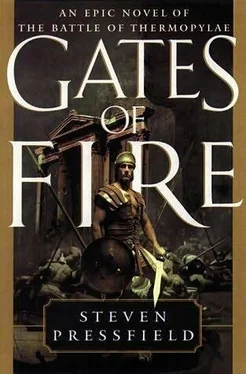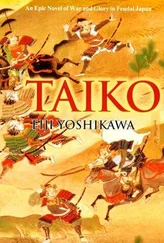Steven Pressfield - Gates of Fire - An Epic Novel of the Battle of Thermopylae
Здесь есть возможность читать онлайн «Steven Pressfield - Gates of Fire - An Epic Novel of the Battle of Thermopylae» весь текст электронной книги совершенно бесплатно (целиком полную версию без сокращений). В некоторых случаях можно слушать аудио, скачать через торрент в формате fb2 и присутствует краткое содержание. Жанр: Историческая проза, на английском языке. Описание произведения, (предисловие) а так же отзывы посетителей доступны на портале библиотеки ЛибКат.
- Название:Gates of Fire: An Epic Novel of the Battle of Thermopylae
- Автор:
- Жанр:
- Год:неизвестен
- ISBN:нет данных
- Рейтинг книги:3 / 5. Голосов: 1
-
Избранное:Добавить в избранное
- Отзывы:
-
Ваша оценка:
- 60
- 1
- 2
- 3
- 4
- 5
Gates of Fire: An Epic Novel of the Battle of Thermopylae: краткое содержание, описание и аннотация
Предлагаем к чтению аннотацию, описание, краткое содержание или предисловие (зависит от того, что написал сам автор книги «Gates of Fire: An Epic Novel of the Battle of Thermopylae»). Если вы не нашли необходимую информацию о книге — напишите в комментариях, мы постараемся отыскать её.
Gates of Fire: An Epic Novel of the Battle of Thermopylae — читать онлайн бесплатно полную книгу (весь текст) целиком
Ниже представлен текст книги, разбитый по страницам. Система сохранения места последней прочитанной страницы, позволяет с удобством читать онлайн бесплатно книгу «Gates of Fire: An Epic Novel of the Battle of Thermopylae», без необходимости каждый раз заново искать на чём Вы остановились. Поставьте закладку, и сможете в любой момент перейти на страницу, на которой закончили чтение.
Интервал:
Закладка:
So complete was His Majesty's victory, Mardonius declared, that the Royal Person need detain Itself not one hour longer here in these hellish precincts at the antipodes of the earth. Leave the dirty work to me, Your Majesty. You yourself take ship home for Susa, tomorrow, there to receive the worship and adulation of your subjects, and to attend to the far more pressing matters of the Empire, which have been in favor of this Hellenic nuisance too long neglected. I will mop up for you. What your forces do in your name is done by you.
And the Peloponnese? the warrioress Artemisia put in, cit-ing the southern peninsula of Greece, which atone of the whole country remained unsubdued. What would you do with it, Mardonius?
The Peloponnese is a goat pasture, the general responded. A desert of rocks and sheep dung, with neither riches nor spoil, nor a single port possessed of haven for more than a dozen garbage scows. It is nothing and contains nothing which His Majesty needs.
Except Sparta.
Sparta? Mardonius replied contemptuously, and not without heat. Sparta is a village. The whole stinking place would fit, with room to spare, within His Majesty's strolling garden at Persepolis. It is an up-country burg, a pile of stones. It contains no temples or treasures of note, no gold; it is a barnyard of leeks and onions, with soil so thin a man may kick through it with one strike of his foot.
It contains the Spartans, the lady Artemisia spoke.
Whom we have crushed, Mardonius replied, and whose king His Majesty's forces have slain.
We slew three hundred of them, replied Artemisia, and it took two million of us to do it.
These words so incensed Mardonius that he seemed upon the point of rising from his couch to confront Artemisia physically. My friends, my friends. His Majesty's conciliating tone made to quell the momentary upset, We are here to take counsel, not brawl with each other like schoolchildren.
Yet the lady's fervor still burned. What is that between your legs, Mardonius, a turnip? You speak like a man with balls the size of chickpeas.
She addressed Mardonius directly, controlling her anger and speaking with precision and clarity.
His Majesty's forces have not even sighted, let alone confronted or defeated, the main force of the Spartan army, which remains intact within the Peloponnese and no doubt in full preparedness, and eagerness, for war. Yes, we have killed a Spartan king. But they, as you know, have two;
Leotychides now reigns, and Leonidas' son, the boy Pleistarchus; his uncle and regent, Pausanias, who will lead the army and whom I know, is every inch the equal of Leonidas in courage and sagacity. So the loss of a king means nothing to them, other than to harden their resolve and inspire them to yet greater prodigies of valor as they seek to emulate his glory.
Now consider their numbers. The Spartiate Peers alone comprise eight thousand heavy infantry.
Add the Gentleman-Rankers and the perioikoi and the tally multiplies by five. Arm their helots, which they mast certainty will do, and the total swells by another forty thousand. To this stew toss in the Corinthians, Tegeates, Eleans, Mantineans, Plataeans and Megarians, and the Argives, whom these others will compel into alliance if they have not done so already, not to mention the Athenians, whose backs we have driven to the wall and whose hearts are primed with the valor of desperation.
The Athenians are ashes, Mardonius broke in. As will be their city before tomorrow's sun sets.
His Majesty appeared of two minds, torn between the prudence of his general's counsel and the passion of the warrioress's advice. He turned to Artemisia. Tell me, my lady, is Mardonius right? Ought I to settle myself upon pillows and take ship for home?
Nothing could be more disgraceful, Your Majesty, the lady replied without hesitation, nor more unworthy of your own greatness. She rose to her feet now and spoke, pacing before His Majesty beneath the arcing linen of His pavilion.
Mardonius has recited the names of the Hellenic cities which have offered tokens of submission, and these I admit are not inconsiderable. But the flower of Hellas remains unplucked. The Spartans' nose we have barely bloodied, and the Athenians, though we have driven them from their lands, remain an intact polis and a formidable one. Their navy is two hundred warships, by far the greatest in Hellas, and every vessel is manned by crack citizen crews. These may bear the Athenians anywhere in the world, where they may reestablish themselves undiminished, as potent a threat to Your Majesty's peace as ever. Nor have we depleted their manpower. Their hoplite army remains untouched, and their leaders enjoy the full respect and support of the city.
We delude ourselves to underestimate these men, whom His Majesty may not know but whom I do. Themistokles, Aristides, Xanthip-pus the son of Ariphron; these are names of proven greatness, fired and ardent to earn more.
As for the poverty of Greece, what Mardonius says cannot be controverted. There is neither gold nor treasure upon these hardscrabble shores, no rich lands nor fat flocks to plunder. But are these why we came? Are these the reason Your Majesty levied and marshaled this army, the mightiest the world has ever seen? No! Your Majesty came to bring these Greeks to their knees, to compel them to offer earth and water, and this, these last defiant cities have refused and yet refuse to do.
Put this fatigue-spawned dream from your mind, Your Majesty. It is a false dream, a phantasm.
Let the Greeks degrade themselves by resort to superstition. We must be men and commanders, exploiting oracles and portents when they suit the purposes of reason and dismissing them when they do not.
Consider the oracle which the Spartans were given, which all Hellas knows, and which they know we know. That either Sparta would lose a king in battle, which calamity had never in six hundred years befallen them, or the city herself would fall.
Well, they have lost a king. What will their seers make of this, Your Majesty? Clearly that the city now cannot fall.
If you retire now, Lord, the Greeks will say it was because you feared a dream and an oracle.
She drew up then, before His Majesty, and addressed these words directly to Him. Contrary to what our friend Mardonius says, His Majesty has not yet claimed His victory. It dangles before Him, a ripe fruit waiting to be plucked. If His Majesty retires now to palaced luxury and leaves this prize to be taken by others, even those whom He most honors and holds dearest to Him, the glory of this triumph is tarnished and defamed. Victory cannot simply be declared, it must be won. And won, if I may say so, in person.
Then, and only then, may His Majesty with honor take ship and return home.
The warrior queen finished and resumed her position upon her couch. Mardonius offered no rebuttal. His Majesty looked from one to the other.
It seems my women have become men, ana my men women.
His Majesty spoke not in rancor or disapprobation, but stretching His right hand across, He settled it with affection upon the shoulder of His friend and kinsman Mardonius, as if to reassure the general that His confidence in him remained steadfast and undiminished.
His Majesty then straightened and with forcefulness of voice and demeanor reassumed His kingly tone.
Tomorrow, He vowed, we will bum Athens to the ground and, following that, march upon the Peloponnese, there to overthrow the very foundation stones of Sparta, not ceasing until we have ground them, everlastingly, into dust.
Chapter Nineteen
His Majesty did not sleep that night. Instead He ordered the Greek Xeones summoned to Him at once, intending even at this advanced hour to interrogate the man personalty, seeking further intelligence of the Spartans, who now, more so even than the Athenians, had become the focus of His Majesty's fever and obsession. The warrioress Artemisia had along with Mardonius been dismissed and was at that moment taking her leave; upon hearing these orders of His Majesty she turned back and spoke with concern for Him.
Читать дальшеИнтервал:
Закладка:
Похожие книги на «Gates of Fire: An Epic Novel of the Battle of Thermopylae»
Представляем Вашему вниманию похожие книги на «Gates of Fire: An Epic Novel of the Battle of Thermopylae» списком для выбора. Мы отобрали схожую по названию и смыслу литературу в надежде предоставить читателям больше вариантов отыскать новые, интересные, ещё непрочитанные произведения.
Обсуждение, отзывы о книге «Gates of Fire: An Epic Novel of the Battle of Thermopylae» и просто собственные мнения читателей. Оставьте ваши комментарии, напишите, что Вы думаете о произведении, его смысле или главных героях. Укажите что конкретно понравилось, а что нет, и почему Вы так считаете.












